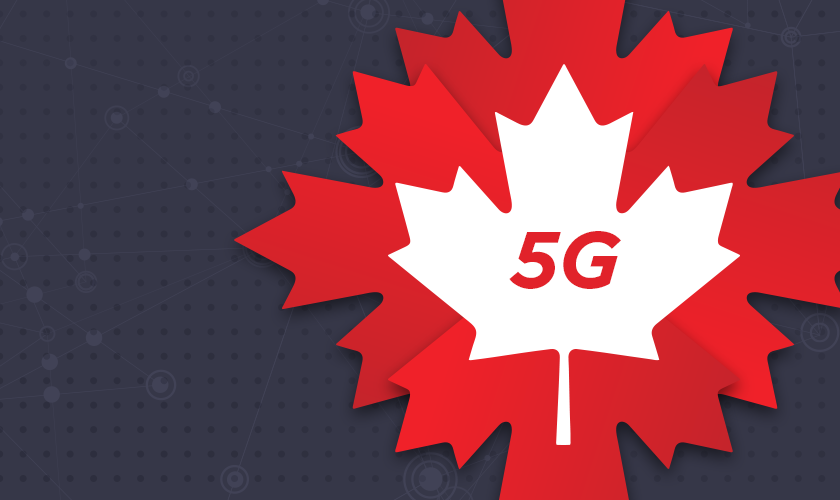

5G may still feel like an emerging technology in Canada as it’s less than a year old and is only available in limited cities. However, operators are actively working to expand coverage, and the country’s 5G speeds are already impressive. This article explores how much of an improvement 5G represents over 4G, which provinces and cities are seeing the most benefit and how individual operators are performing over 5G.
5G is 205% faster than 4G in Canada
Comparing Median 5G and 4G Performance in Canada
Speedtest Intelligence® | Q4 2020
| 5G Download (Mbps) | 4G Download (Mbps) | % Change | |
|---|---|---|---|
| Canada | 169.46 | 55.50 | 205.3% |
Mobile speeds in Canada are strong, with the country consistently ranking in the top ten globally for mobile download speed over the past year according to the Speedtest Global Index™. 5G can only improve overall mobile speeds in Canada, and data from Speedtest Intelligence® reveals Canada’s median download speed over 5G was 205.3% faster than that over 4G during Q4 2020.
Bell was the fastest operator for 5G in Canada
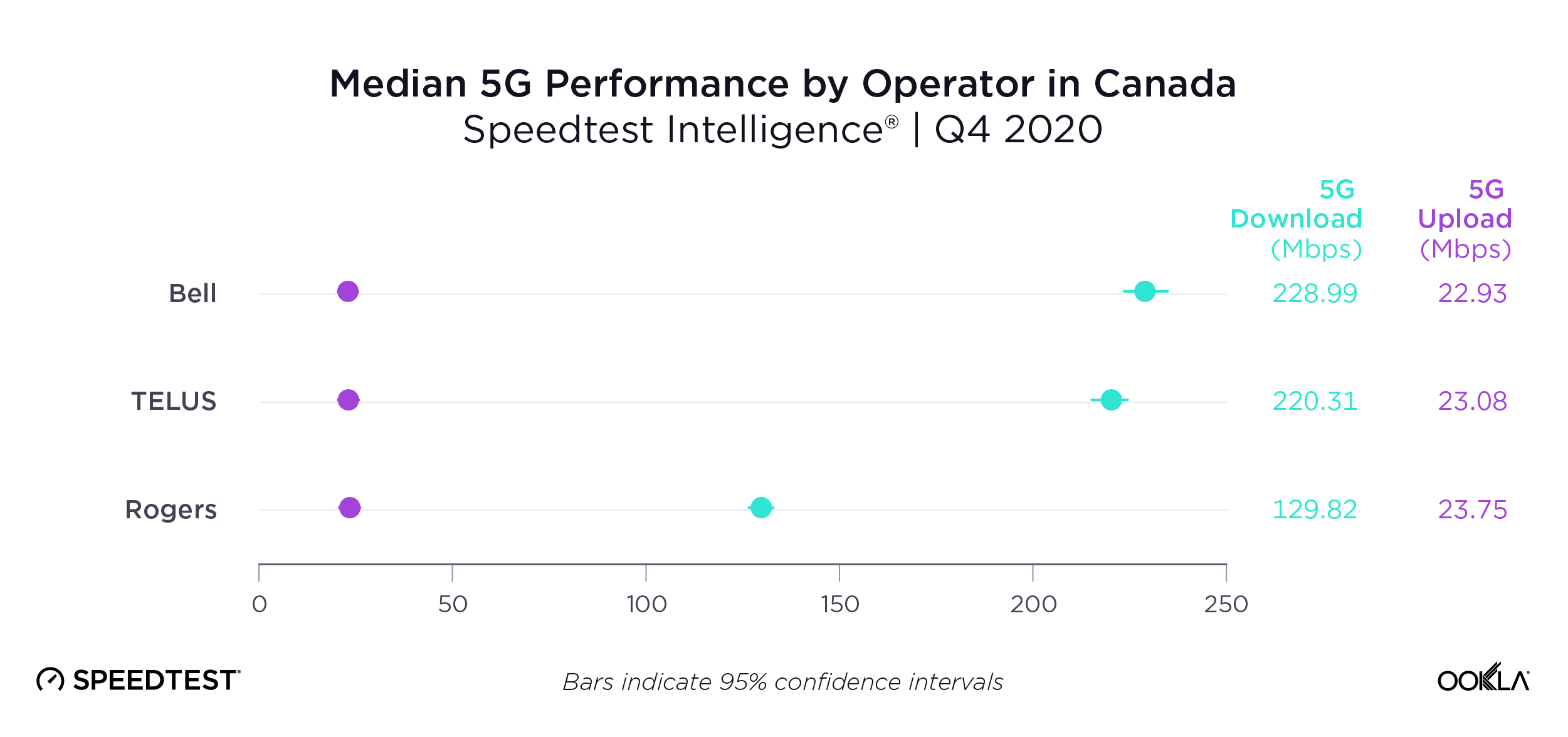
As reported in our Canada Market Analysis, Bell was the fastest operator for 5G in Canada in Q4 2020 with a median download speed of 228.99 Mbps. TELUS was a close second and Rogers third.
Rogers had the highest time spent on 5G in Canada

We calculated the proportion of time that users with 5G-capable devices spent on 5G in Canada and found that Rogers had the highest 5G Time Spent during Q4 2020 at 27.0%. TELUS had the second highest 5G Time Spent in Canada at 21.0% and Bell was third at 12.7%. Time Spent includes time spent on both 5G and 5G roaming.
Over the past several months Canadian operators have continued to expand their 5G footprints, bringing 5G network capabilities to users across many new cities and towns. All major operators have now launched non-standalone 5G deployments leveraging FDD FR1 spectrum assets across low, mid and high bands.
Equipped with 2.5 GHz spectrum to spare, Rogers launched a 5G network in various cities a year ago, now reaching over 160 communities across Canada. With the addition of newly acquired 600 MHz licenses, the operator is looking to deliver even broader coverage and capacity. Recently, Rogers announced the rollout of their standalone 5G core network, which will eventually allow the operator to deliver even more benefits of this technology to users, including ultra low latency and network slicing.
TELUS and Bell utilized AWS-3 spectrum allocation for their initial 5G launch back in June. The operators have been working in close partnership with Ericsson and Nokia to improve network efficiency and user experience.
Canada’s upcoming spectrum auction will unlock a significant amount of bandwidth in the 3.5 GHz range, which should deliver on the promise of greater speeds. It’s worth noting that the current generation of flagship devices powered by Qualcomm Snapdragon X60 5G Modem-RF System are capable of FDD+TDD 5G aggregation, which streamlines the process of adding the soon to be available 3.5 GHz channels on top of the existent FDD 5G coverage layer. This should provide a stepping stone to standalone 5G, and much greater capacity across the 5G footprint.
British Columbia has the most cities with 5G deployments
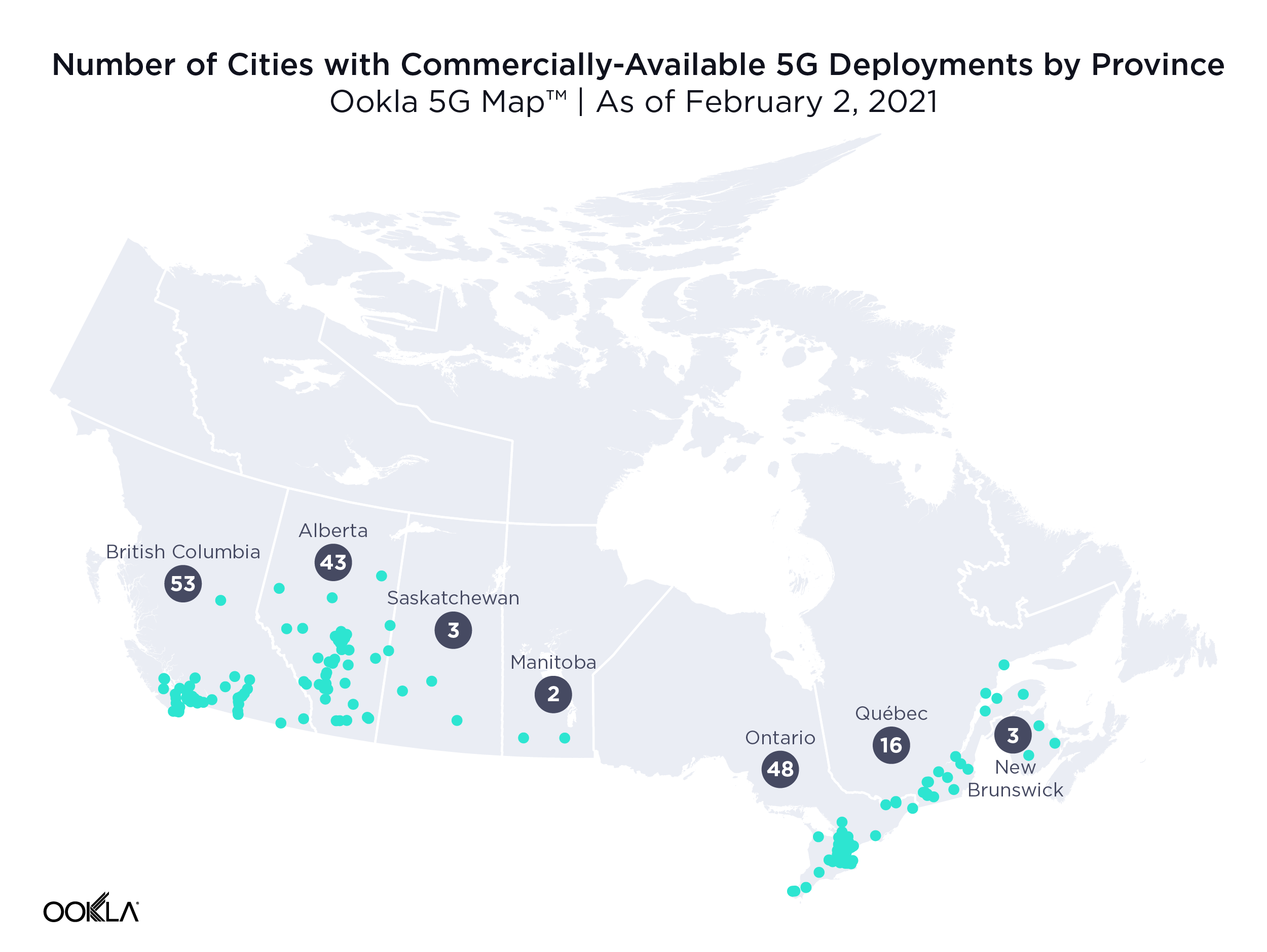
According to the Ookla 5G MapTM, which shows the location of 5G deployments across the globe, British Columbia showed the largest number of cities with commercially available 5G deployments in Canada, as of February 2, 2021. Ontario was second and Alberta third (we included Lloydminster in Alberta’s count).
Québec and Alberta had the fastest 5G download speed
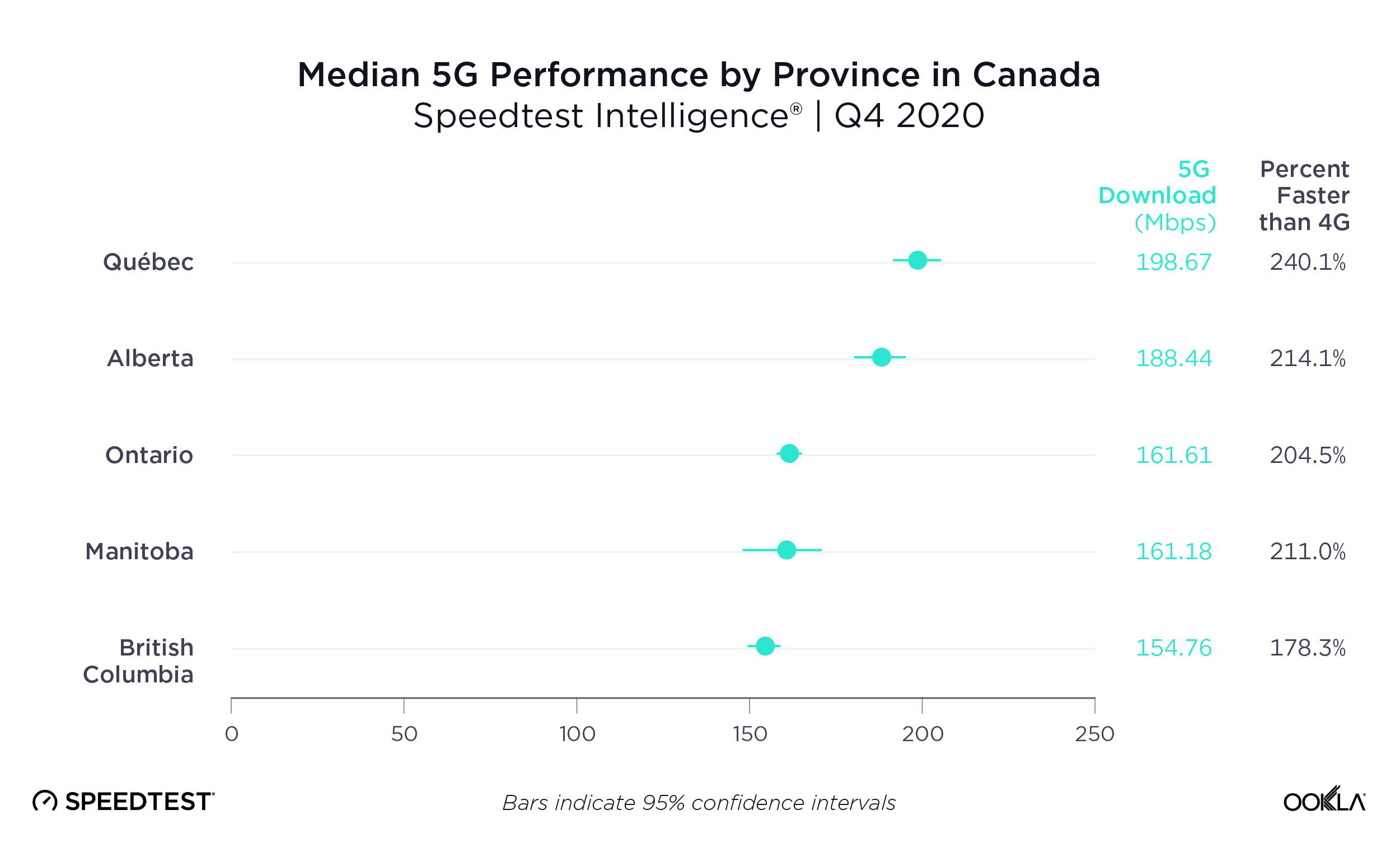
Data from Speedtest Intelligence reveals Québec and Alberta had the fastest median download speeds over 5G during Q4 2020 among Canadian provinces with sufficient 5G samples. The confidence intervals in the chart show that most provinces have comparable 5G performance.
Alberta showed the highest time spent on 5G
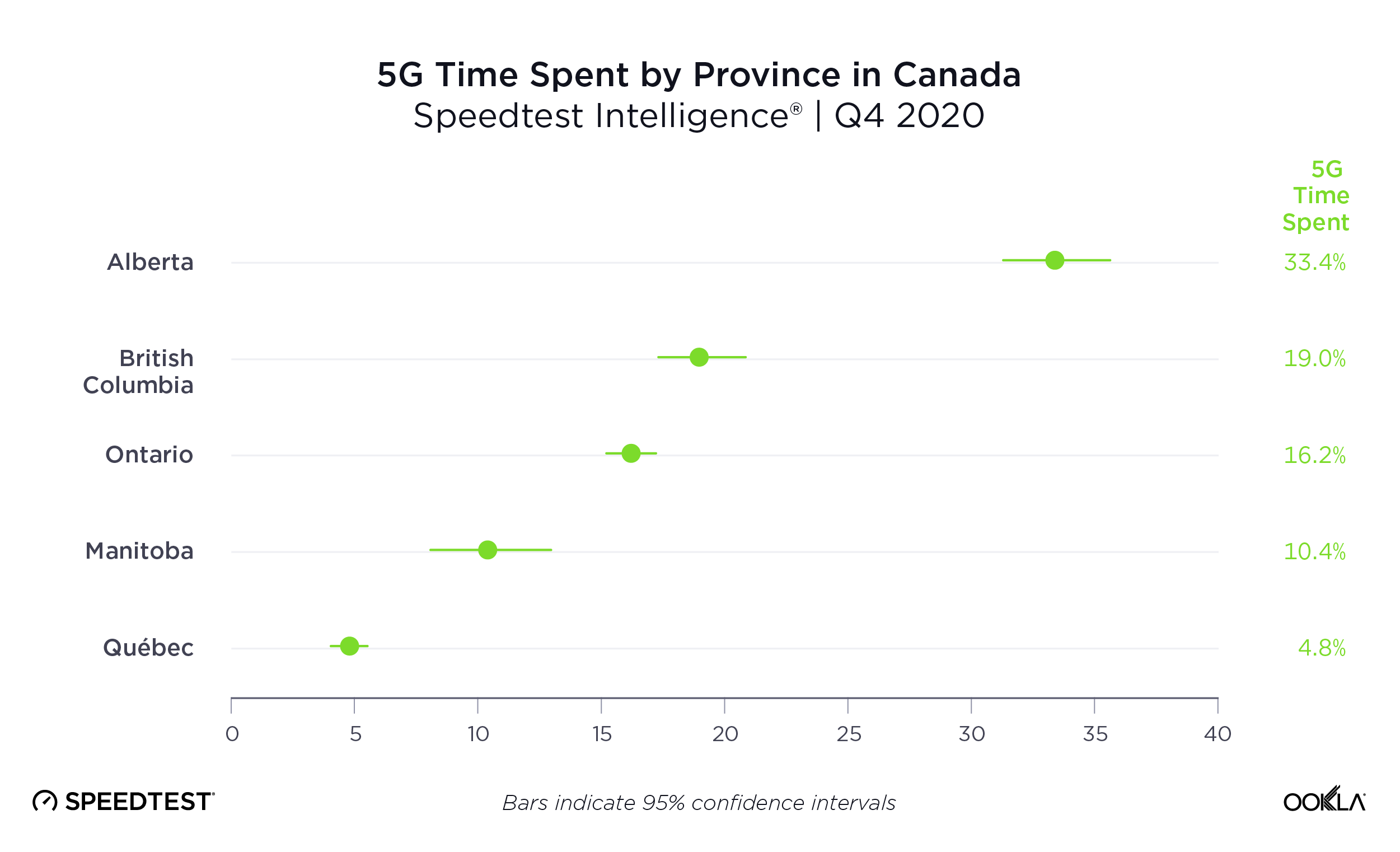
Alberta had the highest percentage of 5G Time Spent among Canadian provinces with sufficient samples during Q4 2020. Users with 5G-capable devices in British Columbia spent the second highest proportion of time on 5G in Canada at 19.0%, and Ontario showed the third highest 5G Time Spent. Québec had the lowest 5G Time Spent on this list during Q4 2020.
Montréal had the fastest 5G download speed
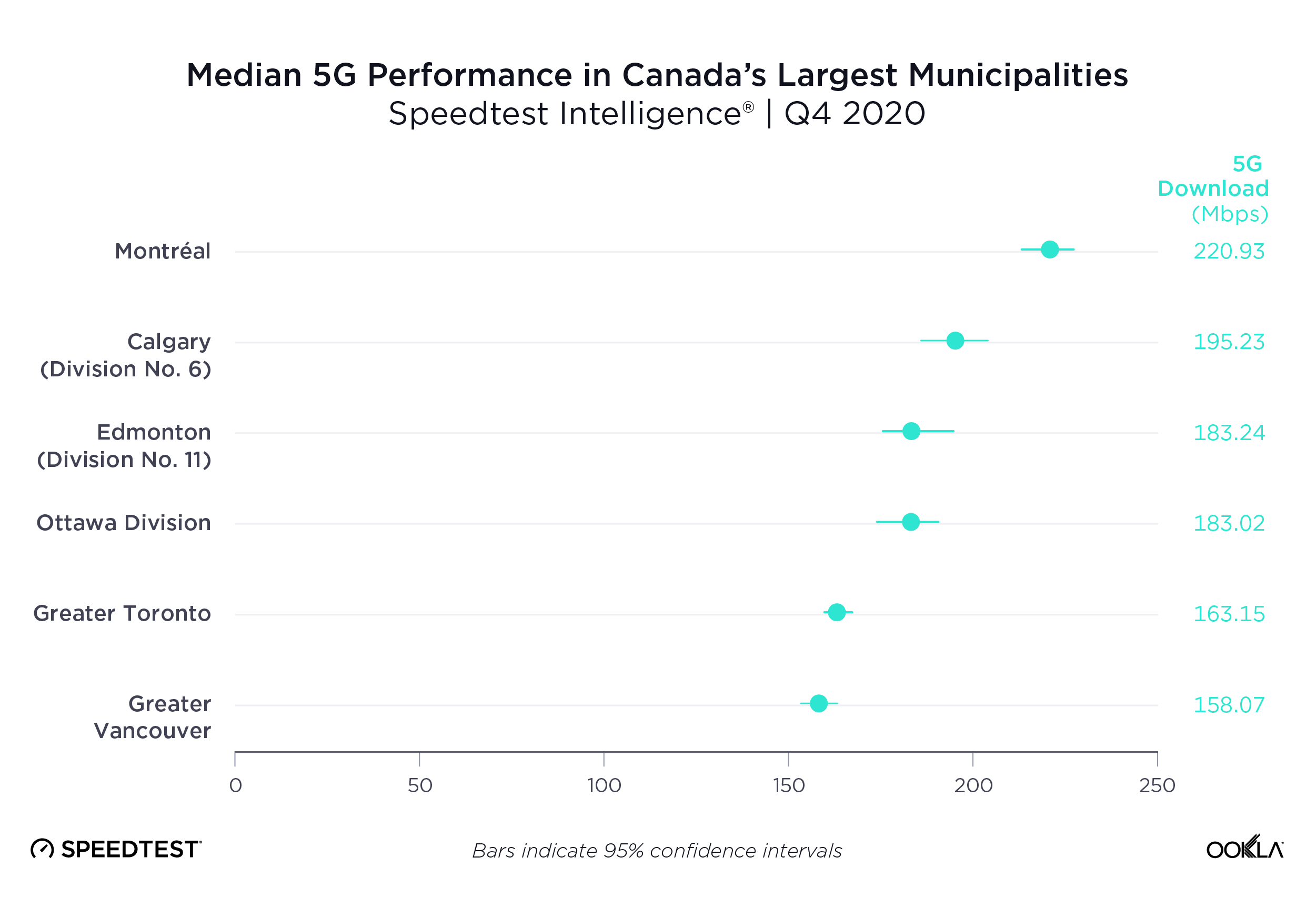
Analysis of median 5G download speed in Canada’s largest municipalities found that Montréal was the fastest during Q4 2020. Calgary, Edmonton and Ottawa formed the group of next fastest cities, followed by Greater Toronto and Greater Vancouver. The confidence intervals in the above chart indicates that the performance among these two groups of cities was too close to definitively rank them.
We’ll be very excited to see how Canada expands on this performance, given the country’s already impressive speeds and expanding 5G footprint. Inquire about Speedtest Intelligence for detailed information about city-level performance by provider or take a Speedtest to see how your network compares.
Ookla retains ownership of this article including all of the intellectual property rights, data, content graphs and analysis. This article may not be quoted, reproduced, distributed or published for any commercial purpose without prior consent. Members of the press and others using the findings in this article for non-commercial purposes are welcome to publicly share and link to report information with attribution to Ookla.
